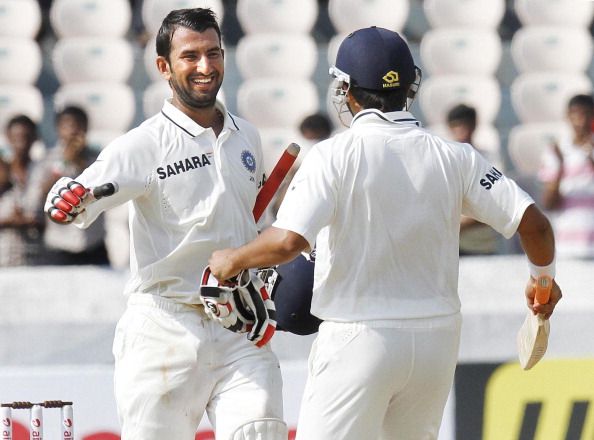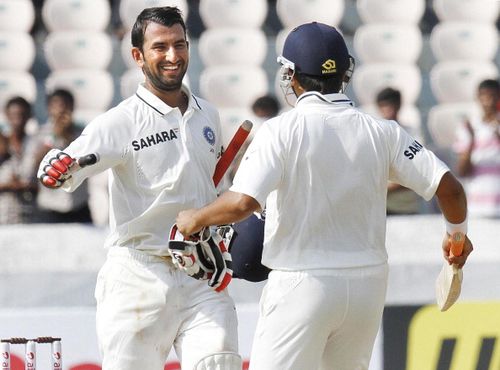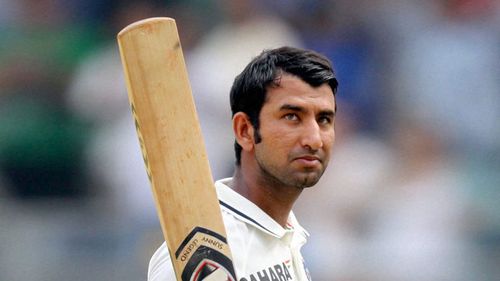
Pujara's tough journey

There have been quite a few articles on Pujara, especially since he had quite a few fabulous innings against some of the top teams in the world. But here is yet another article on Pujara, so brace yourselves.
Cheteshwar Pujara. With 9 matches, 15 innings and 761 runs at an average of 58.53, Pujara is one fine cricketer. This isn’t an article where I’m only going to be spewing lots of statistics and figures – instead, I’m going to be talking about Pujara’s journey before that Test match against England in 2012, when his life changed and his career took off.
10-year old Cheteshwar Pujara loved playing video games. In addition to playing cricket, that is. I think that goes without saying though. That was his favourite pastime. Before he was permitted to hold a remote control and surf through cartoon channels, he was made to sit with his mother Rinaben, and pray. He still prays. Every single day. Before and after his matches. No change there. The change? Rinaben doesn’t pray with him anymore. She hasn’t for the past seven years.
Pujara was playing his sixth test match and trying to fill in those huge shoes of that man Rahul Dravid when he succeeded and made those mammoth runs and tons. He smiled modestly on crossing every single mark, including the two hundredth. Pujara can be called many things – talented, trustworthy, one who never shows emotions – but mainly, the word that seems to stick is simple. But life hasn’t been simple for this green-eyed boy from Rajkot.
Now, Pujara didn’t face issues from his family due to his choice of career because his grandfather Shiv Lal Pujara played for the Dhrangadhra state cricket team, pre-independence. His father Arvind and uncle Bipin played first-class cricket for Saurashtra. Bats, balls and pads are very common things to find lying around at their house in the Railway Colony. His father recalls that it was Rinaben who played a large role in the life of their son, who they call ‘Chintoo’. She was the one who taught him discipline. The day begun with prayers, and then, he would leave either for school, or for the cricket ground if he was playing matches. Arvind recalls that even during matches, Pujara would call regularly to discuss his batting. The family ran into some financial issues when Arvind couldn’t even afford to buy his son a new cricket bat. There was also some contemplation regarding leaving Rajkot and returning to their village. But Rinaben put her foot down and refused to leave Rajkot till her son began playing for India. People would think that this is a usual emotional, sentimental comment from a mother about her son – but in reality, Rinaben had tremendous faith in her son’s abilities and skills. Regarding the bat, Pujara’s uncle put in the money and bought him a bat worth Rs. 5,000, paying the first half and convincing the store manager to allow him to pay off the rest of the money in monthly installments of Rs. 500 per month. Fortunately, this large-hearted deed did not go in vain.
Pujara was only 11 at the time. The year was 2000; the location was the Motibagh stadium and the opponents Baroda. It was an under-14 match. Pujara made 300 plus runs. After that, the hits just kept coming. Only on the field though. Pujara’s mother was diagnosed with cancer.
Fast forward to five years later. It was October 6th 2005. Pujara was playing an inter-district match in Bhavnagar, which his side lost. Pujara called his mother and told her that he would be home early. That was the last conversation Pujara ever had with his mother. Three hours later, Pujara reached home. Rinaben was no more. Pujara’s whole world was turned upside down. His father recollected not only that his son was in immense shock, but also the strength and bravery his son exhibited from then on despite his tremendous loss. Pujara played another match later that week and scored a century. The household responsibilities fell in his father’s hands, and life had to go on. As did cricket. Here’s the proof.
In 2009, Pujara was the highest scorer in the ICC U-19 World Cup with a massive 349 runs. Soon after, he scored a double century against England U-19 and a century for Saurashtra in another first-class match. He was one of the top run-makers in the 2007-08 Ranji Trophy. In the 2008-09 Ranji season, he scored a triple century against Orissa.
Pujara’s first match for India’s national side. It was October 9th 2010 (three days after his mother’s fourth death anniversary). Pujara was debuting in a Test match against Australia in Bangalore. He was only 20 years old. Imagine his tension and nervousness. His first innings gave him only 4 runs. His second gave him recognition. India required 207 for a win and Pujara came out at No. 3. He scored 72 and handed India victory on a silver platter.
During the Indian Premier League of 2011, Pujara sustained a knee injury and was unable to play. As he was recovering in Bangalore he received the horrifying news that his father was undergoing an open-heart surgery. The grateful father remembers that Pujara rushed to him, leaving everything else behind.

For almost 3 years, Pujara was out of the national team, until August 2012 when he wore his white jersey and scored 159 against New Zealand at Hyderabad. This was not enough for the experts. Pujara proved that they could not be more wrong with an unbeaten 206 and 41 in the first test match against England. In the second test match he scored 135. His answer for the question as to how he remains not out and score runs on the slowest of slow pitches is very simple. “I just don’t like getting out,” Pujara said.
Pujara dedicates his success to his late mother Rinaben. He said that his mother always wanted him to play Test cricket. Rinaben taught Pujara to always be true to himself, and told him that with honesty, one would be able to achieve anything and everything.
Today, people, myself included, praise Pujara’s discipline, determination and focus, all of which Pujara says were instilled in him by Rinaben.